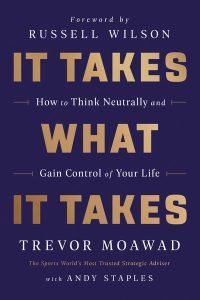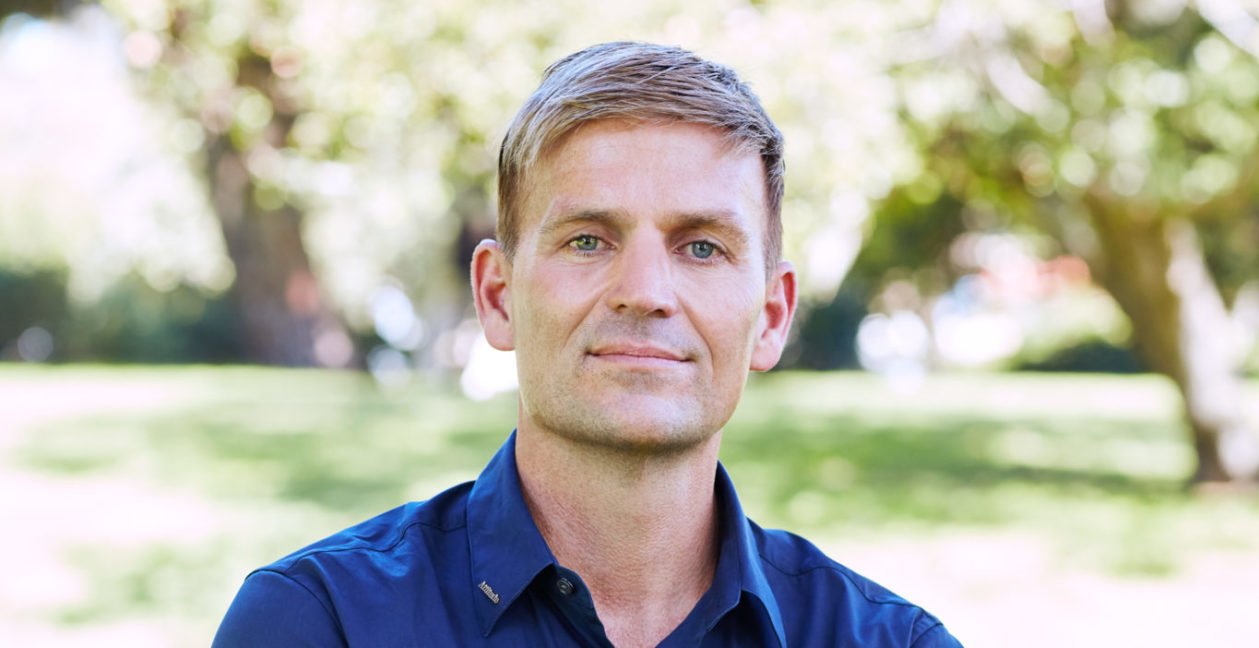Mental conditioning coach Trevor Moawad works with the country’s elite athletes and executives, coaching them through the strategies that he says enable their success. In his new book It Takes What It Takes (Harper Collins, February 2020), Moawad describes how anyone can apply the techniques he uses with the  Seattle Seahawks and U.S. Special Operations forces.
Seattle Seahawks and U.S. Special Operations forces.
Moawad talked with Worth about the critical differences between positive and neutral thinking, why making a list is always a good idea and how to identify effective role models.
Q: What exactly is “mental conditioning?”
A: Mental conditioning started in the 2000s. The idea is: Instead of seeing a therapist to address a problem, what if you use your mind in a way to optimize it? You don’t need to be sick to get better. There are things you can write down and say to get better. There’s a way to minimize negativity, to see yourself doing something in advance of doing it.

In 2000, mental conditioning was the future of sports. In 2019, it is still the future of sports. What does that tell you? While other fields matured and developed, the industry of mental conditioning has remained stagnant. It’s confusing for the consumer. Most don’t understand what it looks like and how to approach it.
At Fort Bragg, I learned about the aggregate of marginal gains: I can optimize in micro-percentages things that are already good and make them better. I can be Steve Cohen and be worth $8 billion and get better. I can be a high performer and get better. I spend my time with athletes and military units that are the best in the world. The pressure is so significant that they know they need to optimize marginal gains.
This sounds very logical. Why don’t more people use this approach?
Average people don’t think about optimization. They behave like average people not because of their aptitude, but because of their daily decisions. It’s tough to help average people. A great performer has exceptional behavior.
I always tell people the real difference of a great athlete or great team is a sum total of what they do, but also what they’re willing not to do. It’s never been aptitude that’s the determining factor. It’s behavior and language.

How is it different from just having a positive disposition?
I’m talking about thinking at a neutral level, not forcing anyone to be positive but letting them not be negative. The question an athlete asks is: Can it help me right now? What allows me to succeed? What are the characteristics I need for success, independent of how I feel about them?
I’m either going to develop the characteristics or I’m not.
The problem with positive thinking is it requires movement from a current state to a better state too fast for most people, and not authentically. “Positive” immediately speaks to a better outcome, but that may not be realistic. People resent that.
Can you tell me about the role of biases, and how they can influence thinking?
Bias is a real thing: gender, selectivity, racial bias. One of the things that’s really powerful is learning to understand our biases and then to take the judgement away. For example, if I was abandoned by my father early on, I might be biased against men trying to exert authority on me. But that doesn’t mean that the person I’m meeting now has anything to do with the situation I experienced in the past. I need to learn to understand, and realize I’m prone to think this way and it’s not his fault. The first way to tackle bias is the idea of being aware that you do have them.
As it relates to positive thinking, my dad was president of National Association for Self-Esteem. We were only trained on negative and positive thinking. My dad wouldn’t let us watch the news in our house, we couldn’t say the word “can’t” or listen to country music. He never told me to be positive, he just wanted to minimize negativity. He taught me how much more powerful negativity was than positivity.
Now that you know this, what are the techniques you recommend?
Negativity is much more powerful than positivity, and the carrier of it is language. Speaking is more powerful than thinking.
I use research from Georgetown professor Christine Porath’s 2016 Harvard Business Review article “Isolate Toxic Employees to Reduce Their Negative Effects.” She talks about de-energizing negativity in the workplace. Language is a carrier for that.
What if instead of telling people to be positive we just stopped saying negative things out loud?
What if instead of telling people to be positive we just stopped saying negative things out loud? What if we just say, “This is the truth, and this is what we know?” What if we stopped talking about the heat or complaining about coaches? By minimizing negativity in our classrooms and our culture, the mind is free to find solutions and not be bogged down.
You have to take the judgement out, and in every aspect of life. For example, the average married couple speaks directly to each other 27 minutes a week. If that stat is even remotely true, it explains a lot about why marriages are struggling. You’re not born with a gene that allows you to make time for your spouse. It’s a decision. It’s a behavior. If you look at a relationship agnostically, you’re either doing it or not. It’s not right or wrong. The neutral idea is if you haven’t made the time and the relationship isn’t what you want, the past isn’t predictive. If you behave differently going forward, the path can be different.
Besides language, what are the other tools your clients use?
Michael Johnson, the great Olympic sprinter in the 1990s and one of my close friends, was asked by a football player readying for the NFL draft, “Do you write down goals?” He said, “Have you ever been to the supermarket without a list?” You walk into Safeway without things written down, you’re going to find yourself spending 20 minutes instead of five minutes, because you’re there without a plan. If it works in Safeway, why wouldn’t you use it in the Olympics? So write it down.
What kinds of exercises do your clients do as part of their mental conditioning and how often do they need to do them?
A lot of it is what we’re going to not do. No one’s walking away from me with a nine-step plan.
It’s incumbent upon me to take them through the fundamentals of thinking: negative versus neutral versus positive. I’ll prove to them that negative thinking is a road they don’t want to go down.
I talk about Roger Federer in the 2017 U.S. Open. He said, “If I ran into a good guy, I was going to lose, I felt.” And then he was out in the quarter finals.
Is being a high performer a collection of gifts or a collection of behaviors? We talk about people who are successful and what they’re doing. We demystify their behavior. Their success is living in their ability to find simplicity.
What do you mean by simplicity?
For Seattle Seahawks quarterback Russell Wilson, there are three things we focus on: great balance, the idea of physically keeping his body in a balanced position, but also balance in his life. Every Tuesday he spends time at bible study and at Seattle Children’s Hospital. The second is great fundamentals: arm and leg placement, how you move and how you run. They’re not right or wrong, they just make football players good. The last thing is being engaged: Sit in the front row, take notes every day, and do things great players do.
It has nothing to do with right or wrong. It is what is.
This sounds a lot like mindfulness.
If I buy a book today at the airport on the mindful athlete, it’s immediately going to go to meditation. Meditation and being present are important, but they are the hardest skills to learn in the psychological field. It’s skipping ahead. The industry has gone to the hardest thing.
If you spend the day saying a bunch of dumb things out loud and listen to a bunch of dumb things, and then use the Headspace meditation app for 30 minutes, what’s the point?
Forget the Headspace app. If you could just not say dumb things out loud, you’d open your mind to be more successful.
You have to know yourself. If you consume news, there may be consequences. We need to know that. If I watch three hours of news, all I’m going to want to do is play in traffic.
What’s the difference between an option and a choice, and why is this important?
You have options all over the place. Options don’t really matter that much, but choices do: Am I going to spend time with this person not? If you want to be successful, you don’t have choices. You can’t do whatever you want to do and be good. That’s the hardest thing for millennials and Gen Z to understand. You might say, “I want to be in a successful relationship.” There’s a finite plan. There’s nothing wrong with not doing it. If you don’t follow what’s agnostically true, and the requirements that are not really choices, you won’t have a successful relationship.
One of my close friends is George Pyne. He was the COO of Nascar and runs Bruin Sports Capital. He makes 10 outgoing calls a week and finds 10 new prospects. He has done this since he was 25 years old. That’s allowed him to be one of the most successful sports businessmen in the world.
How do you recommend your readers identify and involve the best role models in their lives?
If somebody wants something they don’t have, one thing is to identify what someone else you admire has and what they’re doing. I’ll often go see the Seattle Seahawks chaplain Judah Smith. I’ll listen to him talk about how to live life. I’ll take four pages of notes and walk out with a better understanding of how I want to be and what I want to do. That’s a choice I’ll make to have him in my life.
It’s important to have role models. Some of them we never meet, but we develop a relationship with them or look up to them. We don’t envy them, but we study our behavior and model it to the degree they have something to which we aspire. A role model is the physical embodiment of a goal.
What are the essential characteristics a good role model should possess?
Sometimes who we don’t think we are becomes our greatest detriment. We identify ourselves by who we think we’re not. Quarterback Russell Wilson knows he’s not 6’5”, and he was always told he had to be that height to do what he does. He recognizes himself by what he does have, and that’s a real discipline. The world will tell you who you’re not, but it’s up to you to identify who you are. A role model can be very powerful in that.
When my dad was diagnosed with advanced stage multiple myeloma, he was doing everything that he told me to do to help me as a basketball player or a student. As a role model, it was never what he told me, but what impacted me was the way he lived. He wasn’t emotionally very open, but his example was his behavior.
Your bio says your mission is “to motivate the motivated.” Can you teach unmotivated people to become motivated?
I don’t think anyone’s ever unmotivated. I think it’s a matter of when you start to understand that if you want something, it’s not your aptitude that’s going to drive you. It’s your behavior.






